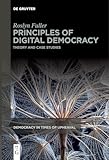Principles of Digital Democracy : Theory and Case Studies / Roslyn Fuller.
Material type: TextSeries: Democracy in Times of Upheaval ; 8Publisher: Berlin ; Boston : De Gruyter, [2023]Copyright date: ©2023Description: 1 online resource (XV, 311 p.)Content type:
TextSeries: Democracy in Times of Upheaval ; 8Publisher: Berlin ; Boston : De Gruyter, [2023]Copyright date: ©2023Description: 1 online resource (XV, 311 p.)Content type: - 9783110794397
- 9783110794540
- 9783110794465
- online - DeGruyter
- Issued also in print.
| Item type | Current library | Call number | URL | Status | Notes | Barcode | |
|---|---|---|---|---|---|---|---|
 eBook
eBook
|
Biblioteca "Angelicum" Pont. Univ. S.Tommaso d'Aquino Nuvola online | online - DeGruyter (Browse shelf(Opens below)) | Online access | Not for loan (Accesso limitato) | Accesso per gli utenti autorizzati / Access for authorized users | (dgr)9783110794465 |
Frontmatter -- Contents -- List of Figures -- List of Tables -- About the Author and the Series Editor -- Introduction -- Chapter 1 What is Digital Democracy? -- Chapter 2 Benefits of Digital Democracy -- Chapter 3 Who Participates and Why? -- Chapter 4 The User Experience -- Chapter 5 Communication -- Chapter 6 Voting -- Chapter 7 Security -- Chapter 8 The Feedback Loop -- Chapter 9 Challenges -- Chapter 10 Conclusions -- Bibliography -- Index
restricted access online access with authorization star
http://purl.org/coar/access_right/c_16ec
Drawing on almost a decade of first-hand experience, Principles of Digital Democracy presents a unique look at digital democracy tools in action. Whether it is carbon budgeting in Canada, voting on legislation in Italy or policy consultation in Taiwan, this book explains not just what is possible to achieve with digital democracy tools today, but how to assess the life-cycle of civic engagement, as well as different approaches to security and policy implementation. Principles of Digital Democracy combines theory with practice, giving the reader an overarching theory of the components (Bestandteile) of digital democracy (e.g. ideation, deliberation, decision-making), as well as numerous case studies from around the world. Interviews with organizers and participants provide further insight into who participates in digital democracy and why they do so.
Issued also in print.
Mode of access: Internet via World Wide Web.
In English.
Description based on online resource; title from PDF title page (publisher's Web site, viewed 26. Apr 2024)


